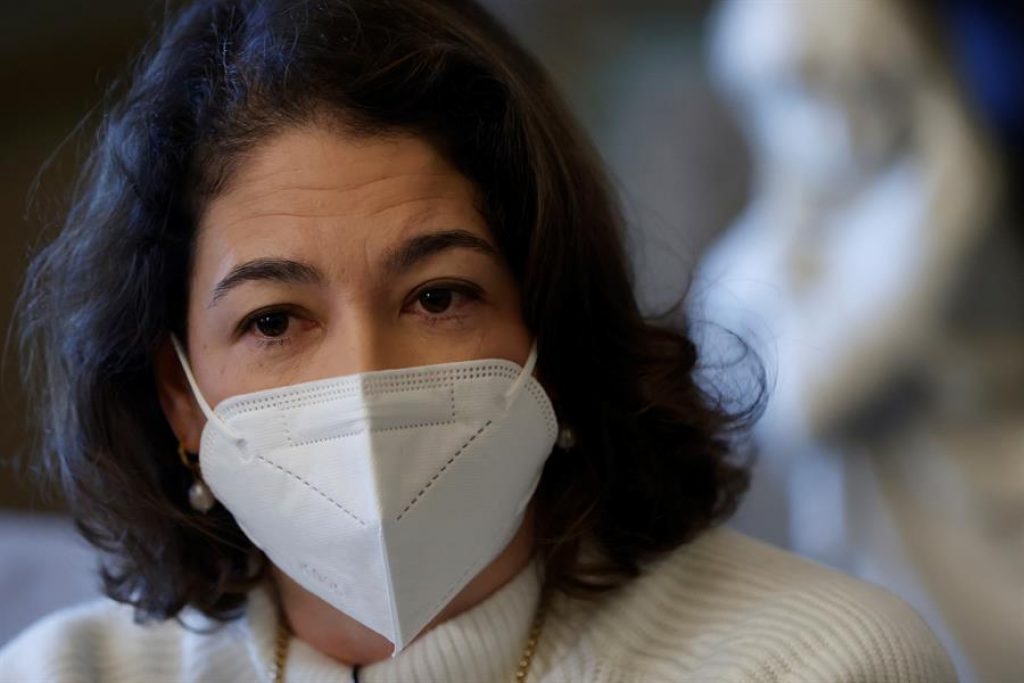“Nicaragua itself is a large prison. Every person who is inside and differs from the Government is kidnapped or has had to go into exile,” said Victoria Cárdenas, wife of presidential candidate Juan Sebastián Chamorro, imprisoned since last 8 June with other opponents of the Government of Daniel Ortega.
Cárdenas is in the Spanish capital on a trip to several European countries to denounce the “inhumane” situation of her husband in prison and of “the more than 170 political prisoners” incarcerated, and request international support for his release “in a manner immediate “.
“I am in Madrid today making a public denunciation of the violation of human rights that we are living in Nicaragua. We have more than 170 political prisoners in inhumane conditions in prisons,” Cárdenas said in his interview at the Casa de América in Madrid.
“What the families of the political prisoners demand is the immediate, unconditional, and guaranteed release of all of them,” said Cárdenas, who also stressed the need to have the support of the international community for this to be possible.
AN URGENT CALL
Juan Sebastián Chamorro’s wife emphasized the humanitarian crisis the country is experiencing, “even more important than the socioeconomic or political crisis, “ and above all the “urgency” of the situation.
“That is why time is so important because, in addition, we do not want this to pass in time, the humanitarian part worries me more because every minute, every day that our relatives spend there, their lives are at risk,” he said.
It did so in comparison with Venezuela, “since journalists who have worked there tell me that Nicaragua is worse.”
“This cannot wait, and the first thing to do has to be the liberation of these people,” said Cárdenas, who believes that only Nicaraguans can overcome the current crisis, although given the impossibility of doing it alone, “we need international pressure,” he reiterated.
And, once the freedom of political prisoners is achieved and public liberties restored, “as Nicaraguans, we should begin a national dialogue but with the conditions that warrant it. With an international presence, with a limited time and with the minimum for this dialogue to have fruits “.
YEARS OF THREATS AND REPRESSION
Cárdenas recalled that since April 2018, when the popular uprisings began in Nicaragua, and when the opportunity for a dialogue with the Ortega government opened, her husband decided to enter politics to work for the country to achieve a peaceful change. Since then the threats began.
“The repression has been harsh against him and against his family. We have had to move from home. He also had a city for jail, he couldn’t leave the city. Then, house for jail, until as a candidate they kidnapped him in a violent and arbitrary way “he explained.
And that repression was not only with him but also with the family, even breaking into the house.
“It’s like getting to the bottom of the human being, damaging what hurts the most. That is why I say that it is not a socioeconomic crisis, but a humanitarian one, because it touches every corner of the human being and separates families, not only when the person is kidnapped, but also with the Exile. Nicaraguans are suffering separation, “he argued.
PSYCHOLOGICAL AND EMOTIONAL TORTURE
In his international complaint, Cárdenas underlines not only the physical isolation to which political prisoners are subjected but also the “psychological and emotional torture” to which they are subjected.
“They are being subjected to daily interviews and interrogations, they told my husband that he was imprisoned, it has been torture for him. There are people who have not seen anyone other than the interrogator in seven months, ” he explains.
He describes the lack of minimum conditions in prison: “they go through prolonged periods of solitary confinement and we do not know about them and their health conditions are declining considerably. That is why their release is urgent.”
“His life is at risk,” he denounces, and “they should not be imprisoned for thinking differently and raising their voices for the rest of Nicaraguans.
